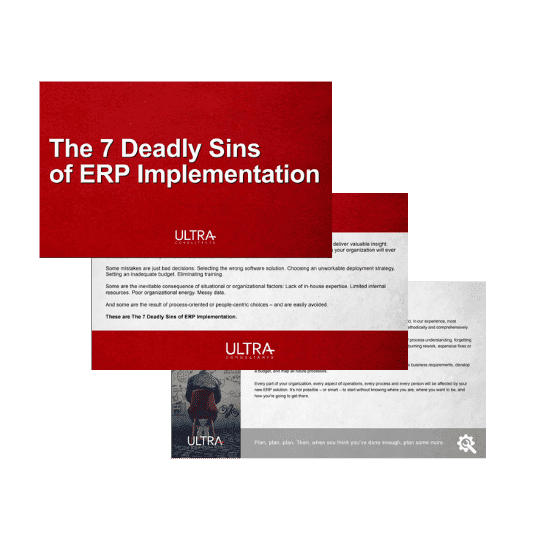A modern ERP solution can supercharge your organization. But its implementation is one of the most complex and high-risk projects your organization will ever undertake. And it is extremely easy to make mistakes.
These are The Seven Deadly Sins of ERP Implementation:
1. Poor project planning
It’s not possible to overstate how essential proper project planning is to success.
2. Less-than-thorough requirements gathering
Comprehensive requirements gathering is the foundation of successful implementations.
3: Excluding critical users from the process
When users and functional managers are involved, you get critical decisions correct.
4. Not prioritizing the user experience
The new generation of users expects an Amazon- or Apple-like experience from their ERP system.
5. Failing to consider an industry-specific solution
Some ERP vendors understand your business at a deep level – and offer important and useful features.
6. Providing inadequate internal support
A successful rollout is achieved with top-to-bottom buy-in, committed resources and proper budget.
7. Neglecting change management
Resistance to change is normal, and plans must be made to minimize its impact.

The 7 Deadly Sins Of ERP Implementation
Some mistakes are just bad strategic or financial decisions. Some are the inevitable consequence of situational or organizational factors. Some, however, are the result of process-oriented or people-centric choices – and are easily avoided. These are The Seven Deadly Sins of ERP Implementation.
Table of Contents
More ERP material...
Top ERP Software Trends 2026: AI Capabilities to Watch
Learn why analyzing and improving processes upfront is critical to reducing risk,…
Why Do Business Process Analysis Before a New ERP System
Learn why analyzing and improving processes upfront is critical to reducing risk,…
Systems Integration in Food Manufacturing: Less Waste, Better Efficiency
This post will examine why managing quality records outside of an ERP…



